
March 04, 2025
Author: Sakshi Chhatwal
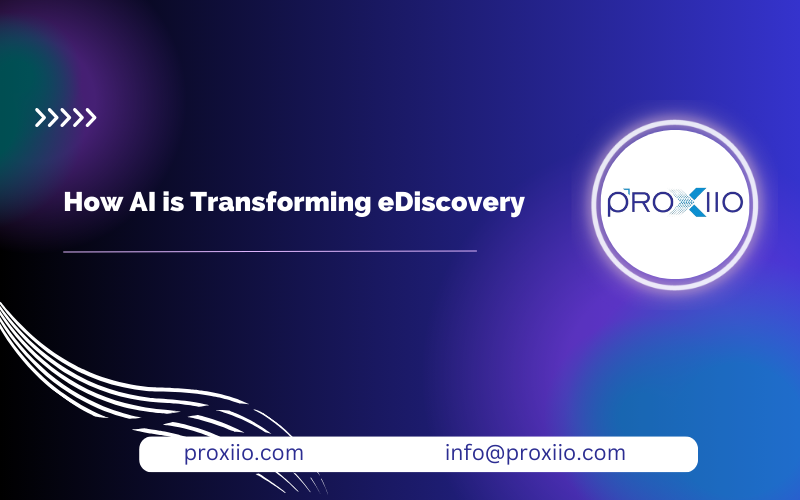
Electronic
discovery, or eDiscovery is the process of identifying, collecting, and
analyzing digital evidence that can be used in litigation or criminal
proceedings. eDiscovery plays a critical role in litigation and criminal
investigations by identifying, collecting, and analyzing digital evidence.
However, traditional methods face challenges such as:
As
legal teams grapple with diverse data formats like emails, instant messages,
and social media content, the demand for efficient, accurate, and scalable
solutions has never been greater.
The
evolution of technology, particularly artificial intelligence (AI), is
addressing many inefficiencies in eDiscovery. The eDiscovery process typically
involves nine stages, including identification, preservation, collection, and
presentation of data. AI plays a transformative role in several key areas:
1.
Technology-Assisted Review (TAR):
2.
Generative AI (GenAI):
3.
Automation of Repetitive Tasks:
Proxiio
is an emerging leader in leveraging AI to redefine eDiscovery processes. Our
tailored solutions address common pain points through innovative features:
1.
Comprehensive Data Discovery:
2.
Enhanced Review Accuracy:
3.
Multilingual Support and Sentiment
Analysis:
4.
Secure AI Implementation:
5.
Scalable and Cost-Effective Solutions:
AI
is revolutionizing eDiscovery by improving speed, accuracy, and scalability.
Proxiio's advanced solutions demonstrate how integrating AI enhances the
effectiveness of legal teams while navigating challenges like data complexity
and evolving privacy regulations. However, AI must complement human expertise,
ensuring ethical, transparent, and reliable outcomes.
By
adopting cutting-edge tools, organizations can stay ahead in the competitive
legal landscape while ensuring compliance and efficiency. Proxiio remains
committed to empowering clients with transformative solutions, reshaping
eDiscovery for a digital-first world.
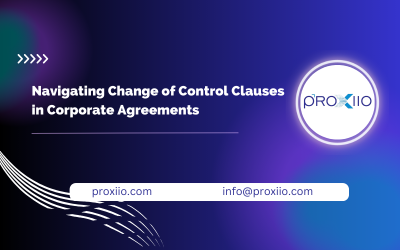
March 05, 2025
Navigating Change of Control Clauses in Corporate AgreementsIn corporate transactions, one of the most critical yet often overlooked aspects of an agreement is the Change of Control (“COC”) clause. This provision governs what happens when there is a significant shift ...

March 04, 2025
Problem Statement: Challenges in Traditional eDiscoveryElectronic discovery, or eDiscovery is the process of identifying, collecting, and analyzing digital evidence that can be used in litigation or criminal proceedings. eDiscovery plays a critical role in litigation and criminal investigations by identifying, ...
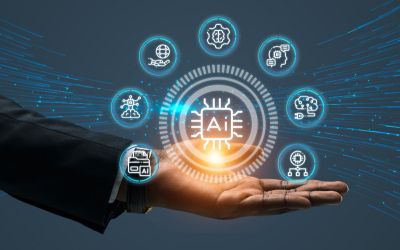
March 12, 2024
“You can have a job if you wanted to have a job for personal satisfaction. But the AI would be able to do everything,” quoted Elon Musk which squarely summarizes the challenge that AI could pose to all professionals including ...
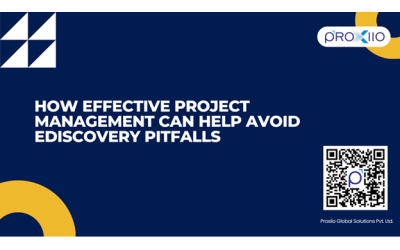
May 21, 2025
In today’s digital-first legal environment, the explosion of electronically stored information (ESI) has fundamentally reshaped litigation. While eDiscovery solutions powered by artificial intelligence (AI) offer unparalleled efficiency and unprecedented speed, they can also become complex and overwhelming without proper oversight.That ...

March 12, 2024
In today’s emerging digital age, collecting customers’ personally identifiable information (PII) is part and parcel of running a business. As data collection technologies evolve, so do regulations designed to protect a consumer’s personal information. One such regulation is the Data ...
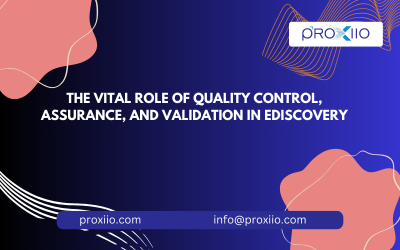
March 04, 2025
The Vital Role of Quality Control, Assurance, and Validation in eDiscoveryeDiscovery involves collecting, reviewing, and analyzing digital data for legal purposes, a cornerstone of modern legal practice. As legal cases increasingly rely on electronic evidence, ensuring the integrity, accuracy, and ...